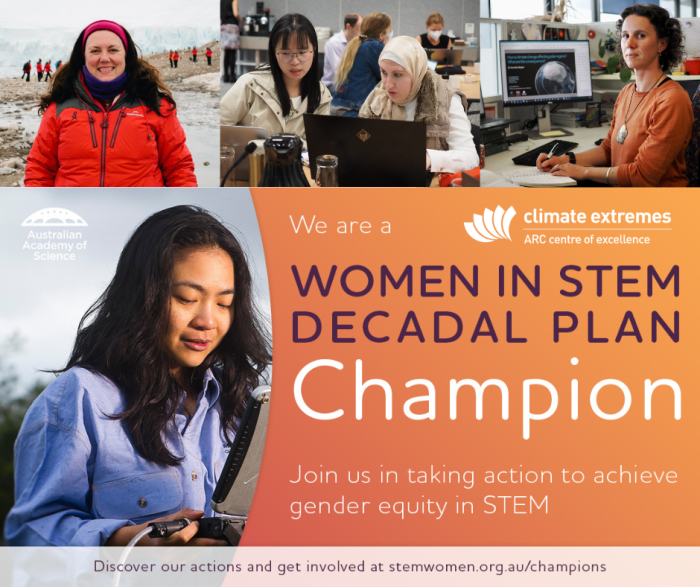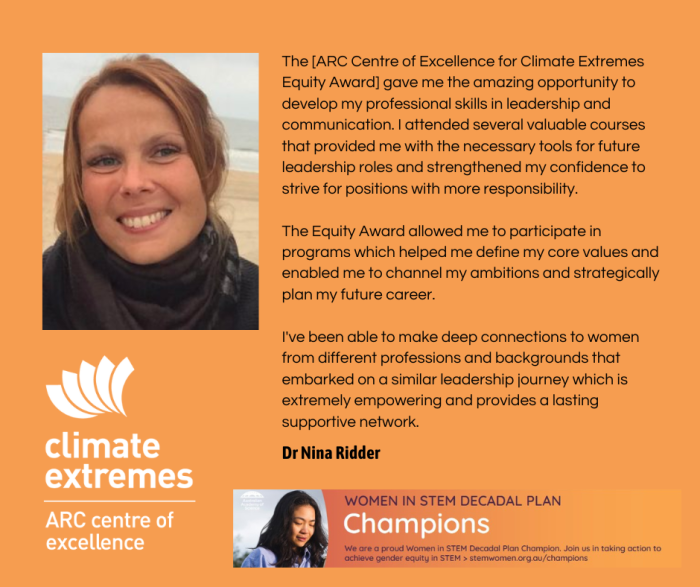
The ARC Centre of Excellence for Climate Extremes is committed to providing an outstanding work and study environment that is inclusive, healthy and respectful. We strive to be an exemplar in tackling inequality and systematic challenges faced by women and other under-represented groups in science.
To further this mission, we’ve joined the Australian Academy of Science’s Women in STEM (Science, Technology, Engineering and Maths) Decadal Plan Champions program.
What does that mean?
Australia’s Women in STEM Decadal Plan provides a shared vision for the STEM ecosystem to attract, retain and progress girls and women in STEM education and careers. Gender equity in STEM will make significant and measurable improvements in Australia’s:
preparedness for the future
workforce participation
economic performance
scientific impacts
creativity and entrepreneurial activities
Our Centre has agreed to align our gender equity initiatives with the decadal plan along with other leading academic, business and government scientific bodies.
Our Centre’s plan focuses on Leadership and Cohesion, Evaluation, Workplace Culture, Visibility, Education and Industry Action.
Leadership and Cohesion
Diversity and Culture committee: We have established a Diversity and Culture committee which is responsible for developing and implementing a range of initiatives in the Centre to raise awareness and enhance equity and inclusion across the spectrums of gender, ethnic and cultural background, sexual orientation, physical ability and neurodiversity. The committee is also responsible for providing sound advice and developing initiatives on issues such as mental health, work-life balance and the Centre’s culture.
Career Development Award for Women and Underrepresented Groups: An award of $10,000 given each year to make a meaningful contribution to the career and professional development of women and other underrepresented groups in the centre. The award provides funding for opportunities that would be otherwise unavailable which will provide a genuine beneficial outcome on the career of the awardee by developing leadership skills, confidence, and assisting the awardee overcome barriers.
Panel pledge: All members of the Centre’s leadership have publicly taken the panel pledge to strive to increase the visibility and contribution of women leaders in public and professional forums.
Opportunities: Highlighting opportunities offered by our institutions and initiatives such as Women in STEM Decadal Plan, and STEM Women that assist in career building and retention.
In order to retain women staff and those from other under-represented groups, we will be proactive in ensuring staff are encouraged to take up a wide range of professional development and leadership opportunities. The centre endeavours to contribute to funding of relevant and beneficial professional and leadership development activities.

Evaluation
Representation: The Centre has 40:40:20 Key Performance Indicators (40% men, 40% women, 20% any gender) for representation of women across all facets of the Centre.
Centre advisory board – Diversity within the Centre is regularly evaluated at our board meetings.
Targeted and gender-neutral recruitment advertising to attract female candidates and those from other under-represented groups.
Recognising that job ads – especially in STEM – have traditionally been written in gendered language, we ensure that our advertisements and position descriptions use language that is gender neutral or proactively appealing to women candidates. All positions are advertised as being available flexibly, either part time or full time. We commit to working with our institutional equity, diversity and inclusion representatives to explore recruitment avenues for Indigenous Higher Degree Research students and staff.
After major recruitment rounds we collate data on the gender ratios of applicants, shortlisted applicants and successful candidates. This data is used to track our progress in attracting gender diverse candidates, and to re-advertise positions if diversity of applicants is not achieved.
Workplace Culture
Weekly hump day tips from the Diversity and Culture Committee that raises awareness around wellbeing, mental health and diversity & inclusion.
Work-life balance initiatives: We encourage and promote flexible working arrangements that enable our staff and students to balance their work and personal lives. This includes offering all Centre positions as full or part time contracts, the ability to negotiate work from home arrangements, a flexible approach to daily start and finish times, and the provision of childcare at key centre events such as the annual workshop. We do not hold meetings earlier that 10am, or after 4pm.
Open dialogue around mental and physical health: The Centre provides a supportive and caring workplace, with wellbeing a foundation of performance and success. Wellbeing and mental health are a regular part of the Centre’s dialogue and culture, including in our welcome pack given to all incoming members of the centre, a dedicated agenda item during Centre inductions, regular talks on mental health and wellbeing, multiple centre members at each node being trained in mental health first aid, and contact details for all nodes’ student counselling services and employee assistant programs available on the centre website and weekly newsletters.
Unconscious bias: We raise awareness of unconscious bias for all selection panel members and defining qualities of excellence of ideal candidates for all Centre positions, irrespective of background.
In addition to institutional training on unconscious bias, we have developed a Centre primer resource. All selection panel participants are required to complete this primer or an institutional equivalent. Panel chairs should remind panellists that the goal is to choose the best qualified candidate for the position regardless of background. The panel should identify the qualities that would make for a top employee at the outset of shortlisting, prior to the commencement of interviews and during final deliberation. Our goals are to focus on recruiting for excellence and to mitigate against the influence of both conscious and unconscious bias.
An inclusive and safe environment: We work to ensure Centre events are inclusive and safe. Registration forms for our major events such as our Annual Workshop and Winter Schools contain a compulsory acknowledgment that participants will abide by respectful, non-discriminatory behaviour. We also provide clear guidance on who participants can talk to if issues do arise.
Visibility
Diversity of speakers at events: We value and encourage diversity in speakers at Centre workshops, professional development courses and research seminars. We also seek to expose staff and students to experts and role models from a wide range of backgrounds. To meet these objectives organisers of all Centre-sponsored events are tasked with creating agendas that aim for gender parity and represent cultural diversity.
Inclusiveness of all participants at events: All staff and students have a voice at centre meetings, workshops, seminars and conferences. It is the responsibility of convenors and facilitators to ensure all participants have an opportunity to contribute and be heard.
Women in leadership: Women hold multiple senior leadership roles in the centre, including leading major portfolios and research programs, and are role models and mentors for all, and for younger women in particular.
Education
STEM engagement: We offer educational resources development workshops for teachers via our Climate Classrooms initiative, and more than 75% of the participants are women teachers teaching STEM subjects. We’re also working with an Australian girls’ secondary school on developing resources for a new data science subject to encourage more girls to get into STEM.
Undergraduate research scholarships: We offer undergraduate and honours scholarships to provide outstanding undergraduate students with an introduction to both the Centre and Climate Extremes research. Our scholarship recipient gender mix is close to parity, and at least 25% of our women recipients continue on to further study in the centre.
Graduate Program: The Centre’s graduate program has reimagined the Australian higher degree research experience. It provides fundamental research and communication skills, professional development, mentoring and leadership opportunities. Our student gender mix sits very close to parity. The program is coordinated by our Graduate Director, a senior woman in STEM, who also acts as a point of contact, advisor and advocate for the Centre’s students.
Industry Action
Centre partners: We are a multi-institutional research consortium. The Centre partners with a range of academic institutions, government agencies and private industry. Our supportive and progressive culture is widely recognised among our partners and our expertise has been sought on matters relating to gender equity and diversity.
Building capacity: Our graduates and alumni are our greatest asset. They have found employment across a wide range of sectors. They take with them not only a foundation of deep scientific rigour but also values instilled from their time working with us. Many of our women alumni have gone on to work in traditionally male-dominated organisations, thereby continuing to contribute to diversity in these organisations. They have been invited back to speak to our students about their careers and, in doing so, have raised the profile of these organisations to current student cohort.
Visibility to industry: We are often invited to give presentations and briefings to individual companies and industry forums. In responding to these invitations, we strive to ensure that the gender of our speakers is well represented.
Download a PDF version of our commitment to the program here.
